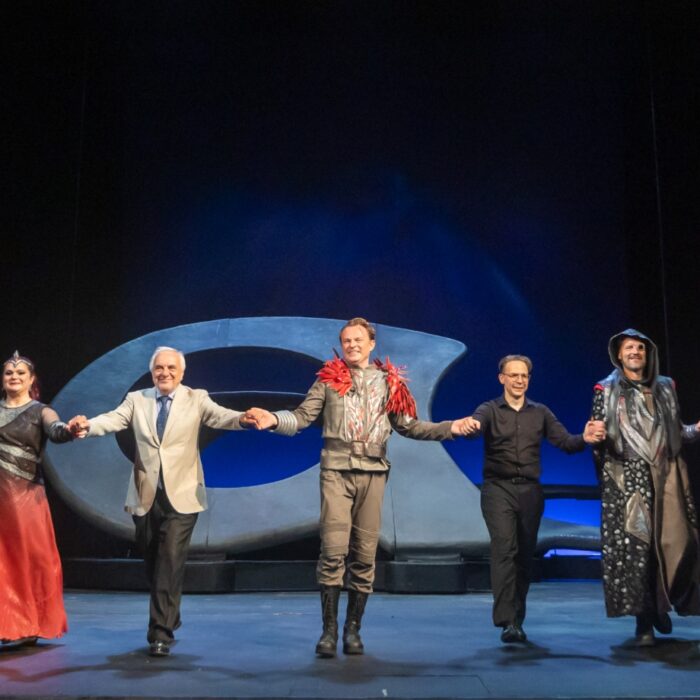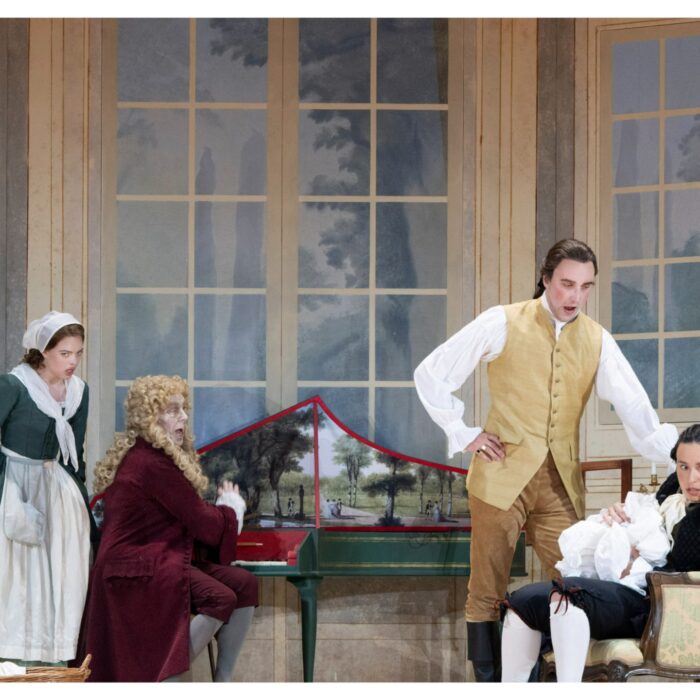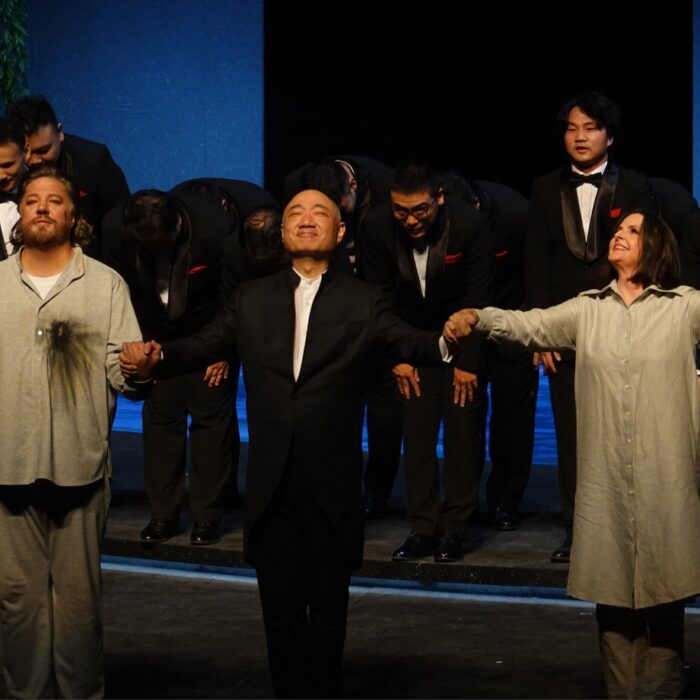
Manhattan School of Music Master Recital 2018: Baritone William Huyler Delivers Knockout Showcase of ‘Forbidden’ Composers
By Jennifer PyronOpening with Ravel’s « Cinq mélodies populaires grecques, » William Huyler set the tone for what was an introspective and heartfelt themed Master recital at the Manhattan School of Music’s Greenfield Hall. Huyler emphasized how each of the art song composers chosen for his recital (Ravel, Mahler and Copland), were each forbidden to have their creations performed at some point in their careers. He noted that their struggle to overcome these obstacles, made them even more special and vital in the classical music world. For example, in Ravel’s cycle we discover his own voice as a composer. Although most would classify him as an impressionist, he was actually far ahead of his time and could be considered to have created his own genre. What he specialized in most, was a simple line and a clarity of expressionism through such simplicity. Some might consider this song cycle to sound thin or underdeveloped, but it’s quite the opposite when you take into count the fully expressed thought development structure and overall melodic delivery.
Ravel
Huyler really captured the true essence of that which Ravel sought to convey. In his opening phrase, “Réveille-toi, réveille-toi, perdrix mignonne,” Huyler supported the text with equal distribution of tonality and emotional pull. He captured the ears and minds of the audience by staying true to the music and portraying this opening piece in an honest and genuine manner. “Là-bas, vers l’église,” was also tenderly expressed in both Huyler’s voice and Shane Schag’s piano accompaniment, together creating an atmosphere of wonder and admiration, as the audience listened intently to the performance. In the third song, “Quel galant m’est comparable,” a burst of energy, during which the singer is called by Ravel to boast about himself through the symbolism of his sword and pistol, we were entertained by Huyler’s natural responsiveness to character depiction and strength in tone. What sets Huyler apart from most is his expressivity. He really brought to life each of the songs and proved this particular cycle still transcends through time, as one of Ravel’s most special and emotional compositions.
Mahler
Huyler took a brief pause to highlight his next song cycle, Gustav Mahler’s “Rückert Lieder,” as his favorite. Mahler is thought to have fused the 19th-century Austro-German tradition and the modernism of the early 20th century through his works as a composer. His music gained wide popularity only after it was banned in much of Europe during the Second World War era. In this specific song cycle, Mahler embraces the hyper-romanticism that is typical of his works, but in a more simplistic manner. For example, in the fourth song, “Ich bin der Welt abhanden gekommen,” the vocal line portrays a peaceful combination of tonal color in the voice and melodic line accompanied by the piano. Mahler intended to emphasize the text in this because he is known to have related to the solitary life as an artist, which Rückert portrays in text:
“I am dead to the world’s tumult
and I rest in a quiet place!
I live alone in my heaven,
in my love, in my song.”
This song displayed another level of dedication and intuitiveness that Huyler possesses as an artist; his voice emoted a rich and magical quality balanced neatly behind a veil of intense emotions. With this, Huyler proved to understand that the success of a performer is not solely based on what can be seen and heard, but even more so on what can be felt. “Um Mitternacht (At Midnight),” is the last song of this cycle and the largest of all five. Mahler intentionally stretches time in this piece, by repeating text that draws the listener deeper into the night. Huyler’s stoic expression and crisp diction created an emotionally dramatic close to the recital’s first half.
Copland
Aaron Copland was Huyler’s next choice selection and he introduced “Old American Songs,” as one of Copland’s most prized compositions. He also mentioned how ironic it was that during the height of his career as a composer and conductor, Copland was under two years of serious investigation by the FBI. The Red Scare weighed heavily on everyone’s minds during this time, and no stone was left unturned, especially for a popular artist. Through this dark time, Copland rose above the chaos and delivered one of the most patriotic compositions ever created. “Old American Songs” is a two group song cycle that portrays an authentic American theme, but what is most special about this cycle is how Copland depicts a simpler way of life and takes the listener back to a less complicated way of living in both text and melody. “The Dodger,” which Copland opens with for his first set, was perfectly delivered by Huyler and the audience smiled along with him as he acted out this piece. The second song, “Long Time Ago,” was more thought provoking and Schag’s piano accompaniment was beautifully aligned with the innocence and purity of its theme. “Simple Gifts,” the most popular song of this set, was the main melody of Copland’s 1944 ballet, “Appalachian Spring.” Both Huyler and Schag enthused the audience with this popular Copland melody and paved way for the entertaining song, “I Bought Me A Cat.” Modeled after the whimsical children’s melody “Old MacDonald,” Copland infuses humor into this song by incorporating animal noises in both the accompaniment and singer’s line. The listeners reveled in the entertainment of this specific piece, especially when Huyler concluded it with Copland’s closing joke about the last animal. The most touching moment during the Copland portion of this recital, was when Huyler performed « At the River, » a hymn dating from 1865 by the Reverend Robert Lowry. What made this song special is how Huyler managed to deliver both the music and the text clearly with a fresh and pure tone. Most recitals come to a crossroads around this point, and the performer can feel too strained emotionally and physically. However, Huyler floated on with a second wind of energy and delicately pulled at the heart strings of each listener.
Mozart
Mozart was the most widely known composer presented at this recital, and the two arias Huyler performed, « Se vuol ballare » and « Non più andrai, » exceeded all expectations. With ease and a sense of cool, Huyler’s voice was focused and indicative of substantial vocal agility. He immediately pin-pointed a clearer and more palpable color of tone that is sure to pave the way for him during upcoming audition seasons.
At the final close, Huyler thanked his voice teacher Mark Oswald, who he has studied with for two years, and what resounded most with us is when the singer mentioned how supportive Oswald was from the start of his training. A combination of loving support, paired with a remarkably talented and passionate singer proved to be this recital’s most noted underlying theme.


